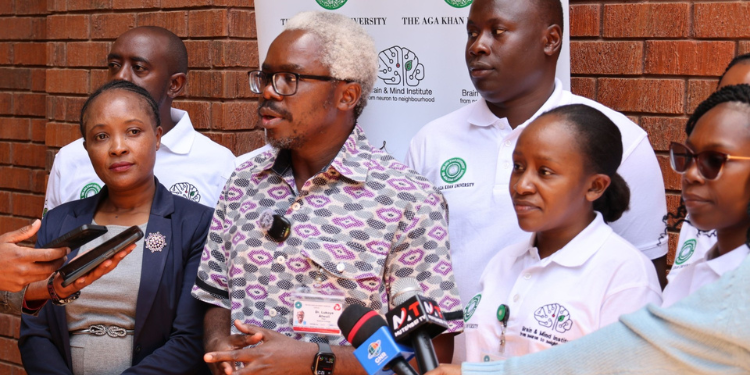A new study has revealed that Kenyan adults are carrying a heavy burden of trauma, with more than half of the participants showing probable signs of Post-Traumatic Stress Disorder (PTSD), and Westlands recording the highest prevalence.
The findings, unveiled on September 25 during a dissemination event for the Genetics of PTSD in African Ancestry Populations (GPAA) study hosted by the Aga Khan University’s Brain and Mind Institute (BMI), brought attention to one of Africa’s most overlooked mental health challenges.
According to the report, residents of Westlands reported significantly higher levels of Post-Traumatic Stress Disorder (PTSD) symptoms compared to residents living in Kibra.
The study further revealed sharp geographic differences across Nairobi’s urban areas, with Westlands Subcounty recording the highest prevalence of PTSD symptoms in the past month at 48%, compared to Kibra, which reported the lowest at 17%.
Westlands Residents Face Higher Stress Levels Than Kibra
Researchers noted that trauma is not evenly distributed but is influenced by living conditions, socioeconomic status, access to services, and community safety.
The findings point to the urgent need for targeted, context-specific interventions to address the unique challenges of each subcounty and ensure that mental health resources reach the most affected communities.
“The results also revealed notable geographic differences across Nairobi’s urban areas, with Westlands Subcounty reporting the highest prevalence of PTSD symptoms in the past month at 48%, while Kibra reported the lowest at 17%,” part of the statement read.
The research was led by Prof. Lukoye Atwoli, Deputy Director at BMI and Dean of Medical College at Aga Khan University, East Africa, in collaboration with international investigators Prof. Benjamin Neale and Prof. Karestan Koenen from the Harvard T.H. Chan School of Public Health and the Broad Institute of MIT and Harvard.
Also Read: Only 5% of Kenyans Are Not Stressed About Financial Situation- Report
PTSD in Africa
According to the team, the study seeks to expand understanding of the genetic makeup of PTSD in African populations, strengthen local research capacity, reduce stigma, and contribute to the first large-scale, genome-wide investigation of PTSD in individuals of African ancestry.
Speaking at the event, Atwoli highlighted the importance of ensuring African voices are represented in global psychiatric research.
“Africa has historically been left behind in psychiatric genetics research, and this study marks a turning point. By focusing on African populations, we are uncovering the true scale of PTSD and related disorders while generating knowledge that will lead to equitable, effective, and locally relevant interventions.”
Also Read: Music vs Stress: How Music Affects Your Brain Instantly
Key Findings
Additionally, the findings indicated that 55% of Kenyan adults are likely to have experienced PTSD at some point in their lives, with 21% showing symptoms in the past month.
The study further showed gender disparities, with women more affected than men — 61% of women reported lifetime PTSD compared to 39% of men.
Speaking on the policy implications, Mercy Karanja, Director of the Mental Health Division at the Ministry of Health, stressed that the findings highlight the urgency of placing mental health at the core of national priorities.
“These findings show us the extent to which trauma and PTSD are affecting Kenyans and remind us that mental health must be at the centre of our health priorities. With this evidence, we can design stronger policies, allocate resources more effectively, and ensure communities across the country have access to care that meets their needs.”
Follow our WhatsApp Channel and X Account for real-time news updates.












































































